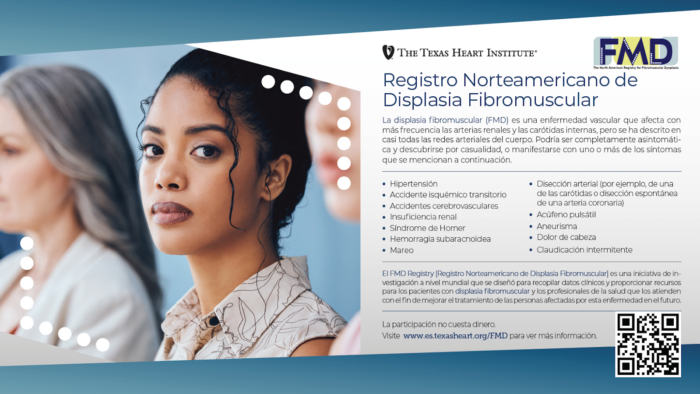North American Registry for Fibromuscular Dysplasia

The North American Registry for Fibromuscular Dysplasia is a global research effort designed to collect clinical data and provide resources for Fibromuscular dysplasia (FMD) patients and healthcare providers. Registries collect information that can be used to study and learn more about a specific condition. This information will help improve the treatment of patients with FMD in the future.
Fibromuscular dysplasia (FMD) is a non-atherosclerotic, non-inflammatory vascular disease that most commonly affects the renal and internal carotid arteries but has been described in almost every arterial bed in the body. It may be entirely asymptomatic and discovered incidentally or present with one or more of the symptoms.
The prevalence and natural history of FMD is not known. Since FMD may involve many different organ systems, several different specialists may see patients with FMD. To date, no large, randomized prospective trials exist to help guide therapy since fibromuscular dysplasia is not commonly recognized and is less common than other diseases seen by internists, nephrologists, neurologists, pediatricians, and vascular specialists. Therefore, recommendations are based on early registry data,1,2, and in conjunction with findings from international researchers.3 Patients often have difficulty finding physicians who have experience treating patients with fibromuscular dysplasia.
Common Symptoms
- Hypertension
- Transient ischemic attack
- Stroke
- Renal failure
- Horner’s syndrome
- Subarachnoid hemorrhage
- Arterial dissection (including spontaneous coronary artery dissection [SCAD])
- Dizziness
- Pulsatile tinnitus
- Aneurysm
- Headache
- Claudication
- Mesenteric ischemia
References:
-
Olin JW, Froehlich J, Gu X, et al. The United States Registry for Fibromuscular Dysplasia: Results in the First 447 Patients. Circulation. 2012;125(25):3182-3190.
-
Olin JW, Gornik HL, Bacharach JM, et al. Fibromuscular Dysplasia: State of the Science and Critical Unanswered Questions. Circulation. 2014;129(9):1048-1078.
-
Gornik HL, Persu A, Adlam D, et al. First International Consensus on the Diagnosis and Management of Fibromuscular Dysplasia. Vascular Medicine. 2019; 24(2):164-189. doi: 10.1177/1358863X18821816.

How to Participate
Subjects with fibromuscular dysplasia may contact the registry or be identified by their provider or through a search of diagnosis codes from medical records.
Patients must have diagnostic images confirming the FMD diagnosis and consent to participate.
Taking part in this registry is entirely voluntary. The information collected may help to improve the treatment of patients like you in the future. There is no additional charge to you or your insurance company to participate in the FMD Registry. Baseline data to be collected includes past medical history, results of diagnostic testing including (CT angiogram, MR angiogram, or catheter angiogram) which best confirm the diagnosis of FMD, invasive procedures performed, symptoms at the time of diagnosis, and medications used.
Follow-up
Collected annually on patients who have had subsequent clinic visits with an FMD provider or other health care provider. If a provider does not see a patient annually in the clinic, follow-up data are collected by mail, electronic questionnaires, or telephone.
Contact Dr. Coulter to Learn More & Participate

El Registro Norteamericano de Displasia Fibromuscular


.svg)


